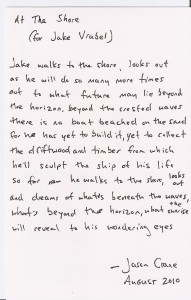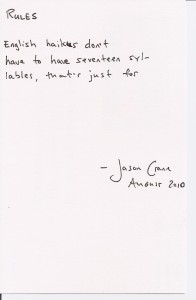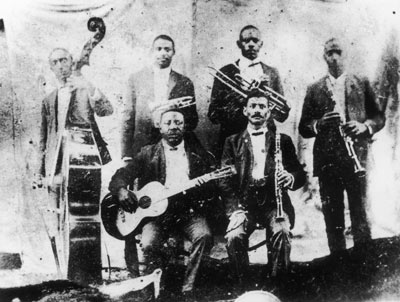I wrote this poem after the Third Thursday Poetry Reading tonight, based on a comment Dan Wilcox made during the reading as the sound of sirens faded on the street outside.

Life Is Whirling Around Us
While we are reading poetry,
an elderly woman in a flower-print dress
is clutching her chest in a kitchen on Hamilton Street
she knocks over the pitcher of cream she’d just poured
for the cup of coffee she’ll never get around to drinking
While we are reading poetry,
he finally gins up the nerve to lean toward her
and she leans toward him and the moment
they both spent the whole night thinking about
is even better than they’d thought it would be
While we are reading poetry,
the passing sirens are responding to a cigarette
left unattended in a bed already stained with cheap wine
as flames lick the newspaper he hadn’t really wanted to read
but had fished out of the trash can anyway
While we are reading poetry,
the newest father in Albany feels his knees weaken
and his heart grow three sizes as the doctor
places his crying daughter in his arms
and the man turns to show her to his wife
While we are reading poetry,
a kid from Sioux Falls is taking his first major-league at-bat
in a city he’s never been to, in front of a crowd of strangers
and back home his mom is wiping her eyes – and so is his dad –
as everyone he’s ever met gathers around the family television
While we are reading poetry,
a housewife is discovering a stack of letters
she never would have found except that she’d finally decided
to clean her husband’s dresser drawers all the way to the backs
and now she’s hunched over sobbing on the suddenly massive bed
While we are reading poetry,
a kid is coming in the door from his job bagging groceries
to find a letter in a fancy envelope from the college
he’d applied to without telling anyone
he runs up to his room to open it behind his closed door
We are reading poetry while
life is whirling around us, depositing the ore
we’ll mine for the next stanza, filling the good earth
with a rich lode of the precious materials we’ll find
with lamps mounted on our helmets, down there in the dark














